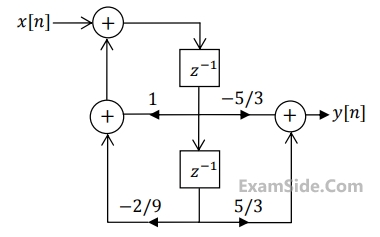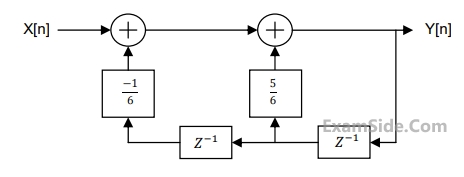1
GATE ECE 2015 Set 3
MCQ (Single Correct Answer)
+2
-0.6
A realization of a stable discrete time system is shown in the figure. If the system is excited by a
unit step sequence input x[n ] , the response y[ n] is


2
GATE ECE 2015 Set 1
MCQ (Single Correct Answer)
+2
-0.6
For the discrete-time system shown in the figure, the poles of the system transfer function are located at


3
GATE ECE 2015 Set 1
MCQ (Single Correct Answer)
+2
-0.6
The pole-zero diagram of a causal and stable discrete-time system is shown in the figure. The zero at the origin has
multiplicity 4. The impulse response of the system is ℎ[n]. If ℎ[0] =1, we can conclude.


4
GATE ECE 2014 Set 1
MCQ (Single Correct Answer)
+2
-0.6
Let x $$\left[ n\right]$$= $${\left( { - {1 \over 9}} \right)^n}\,u(n) - {\left( { - {1 \over 3}} \right)^n}u( - n - 1).$$ The region of Convergence (ROC) of the z-tansform of x$$\left[ n \right]$$
Questions Asked from Discrete Time Signal Z Transform (Marks 2)
Number in Brackets after Paper Indicates No. of Questions
GATE ECE Subjects
Network Theory
Control Systems
Electronic Devices and VLSI
Analog Circuits
Digital Circuits
Microprocessors
Signals and Systems
Representation of Continuous Time Signal Fourier Series Discrete Time Signal Fourier Series Fourier Transform Discrete Time Signal Z Transform Continuous Time Linear Invariant System Transmission of Signal Through Continuous Time LTI Systems Discrete Time Linear Time Invariant Systems Sampling Continuous Time Signal Laplace Transform Discrete Fourier Transform and Fast Fourier Transform Transmission of Signal Through Discrete Time Lti Systems Miscellaneous Fourier Transform
Communications
Electromagnetics
General Aptitude